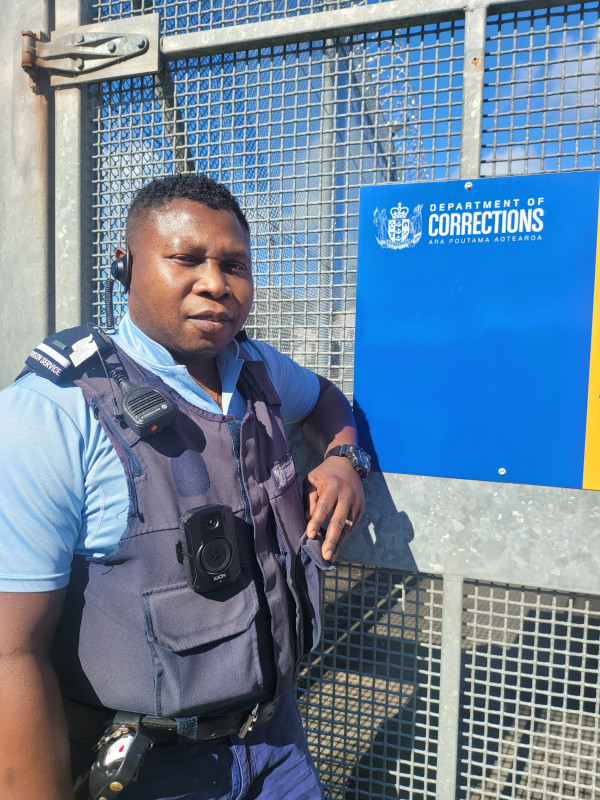25 September 2024
Moving across different roles at Corrections
With hundreds of different roles across the country, it’s not uncommon for staff at Corrections to start in one role and move across to another. This could be include moving across to another frontline role or trying their hand at a role more involved in strategy or enabling.
We talked to three staff members who moved across into different roles within Corrections, to hear how they found the transition, and any advice they have for people considering a new step in their career pathway.
Samuel – Community Work Supervisor to Corrections Officer
For Samuel, it was an event with staff from different roles that helped to inspire him to consider the different career possibilities at Corrections.
Samuel started out as a Community Work Supervisor after being encouraged to join Corrections by a family member working in the probation space. He was hesitant about the role at first, but soon found that the role provided a lot of opportunity to connect with people on community work sentences and provide support where he could.
He also appreciated the opportunity to do positive work in the community.
“A lot of the time it was non-for-profit organisations we were working for. So, it was really good getting to know people in places like the council, schools and retirement villages.”
While he was working as a Community Work Supervisor, he was invited to an event for staff in different roles across the country. Representatives from each role were selected to attend the event, which provided the chance for Samuel to talk to people in different careers, including a Corrections Officer.
In talking with the Corrections Officer, Samuel thought the role could be for him.
“It drew my attention because I want to give back in any way I can. I grew up in an area where violence was quite high, and when he told me about the Corrections Officer role, I thought this was an area where I could get involved in and help.”
Samuel has now been working for Corrections for sixteen years. He says that his current role as a Corrections Officer has its hard days and challenges, but he also feels like he’s had the opportunity to make an impact on people’s lives.
He says that in transitioning from Community Work Supervisor to Corrections Officer, it helped to have transferable skills such as safety awareness and communication.
“Whether you’re working in probation, or case management, whatever it is with Corrections, it is still an opportunity to work with people, and to help out the community at the same time.”

Casey – Bail Support Officer to Probation Officer
Casey started her journey at Corrections right when Bail Support Services was first established. She says that when the service was in the early stages, her role initially involved building relationships across the justice sector and helping to identify areas where the service could support best.
Once the service was set up, her role evolved into report writing, working with lawyers to confirm bail addresses for individuals, contacting whānau to arrange home visits, carrying out interviews in prison with people on remand, and working external agencies such as Police and Lawyers.
Casey says the role had a fair bit of interaction with Probation Officers, as well as an overlap in responsibilities with the Probation Officer role, which helped to pique her interest in the position.
“For example, it was always beneficial and best practice to have a kōrero with the Supervising Probation Officer prior to making recommendations for the reports we were writing. These discussions were like my foot in the door when it came to frontline sentence management.”
From there, the probation officer role felt like a natural opportunity for Casey to try out something new. She says that it helped that through her work as a Bail Support Officer she was already familiar with the probation team, some of their processes and understood the context of the mahi.
She’s now a Senior Practitioner (a senior role in the probation space, working on more complex cases).
Casey says that her advice for anyone considering taking on a new role is to go for it.
“You miss 100% of the shots you don’t take! Don’t underestimate the knowledge and expertise you’ll bring.”

Sally-Ann – Probation Officer to Programme Facilitator
Sally-Ann began in the community space. She first worked as a probation officer in the community work space, where she says she loved the interactions with community organisations, then moved into sentence management.
While working as a probation officer, she was in the same office as programme facilitators, which got her interested in their work.
“I would ask people on my caseload attending what they were covering and what they were learning, which sparked my interest more. For example, I remember speaking to one man who described distress tolerance to me and how he would manage these situations.
I believed in the programmes, so I made sure that people on my case load had the opportunity to attend assessments and worked closely with the programme facilitators. When the participants would invite me to their graduation, I felt very honoured to be part of that.”
Sally-Ann says that moving into a new role had its challenges and adjustments at first, but she had a very supportive team which helped. For those that are interested in exploring a new role in the programmes space, Sally-Ann says that she encourages people to consider their why.
“A key for me is reminding myself that ‘people are people’ and being able to separate the behaviour from the person. I believe programme facilitation is planting a seed, instilling hope, and maybe down the track they will remember a conversation or a model that might help them.
I think if you can build rapport with people, show manaaki when needed and have challenging/courageous conversations (in a nice way) then definitely give it a go!”
Ready to make a move?
Start your journey - check out the a list of our current opportunities then apply online today!